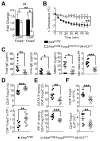Regulatory T cell reprogramming toward a Th2-cell-like lineage impairs oral tolerance and promotes food allergy
- PMID: 25769611
- PMCID: PMC4366316
- DOI: 10.1016/j.immuni.2015.02.004
Regulatory T cell reprogramming toward a Th2-cell-like lineage impairs oral tolerance and promotes food allergy
Abstract
Oral immunotherapy has had limited success in establishing tolerance in food allergy, reflecting failure to elicit an effective regulatory T (Treg) cell response. We show that disease-susceptible (Il4ra(F709)) mice with enhanced interleukin-4 receptor (IL-4R) signaling exhibited STAT6-dependent impaired generation and function of mucosal allergen-specific Treg cells. This failure was associated with the acquisition by Treg cells of a T helper 2 (Th2)-cell-like phenotype, also found in peripheral-blood allergen-specific Treg cells of food-allergic children. Selective augmentation of IL-4R signaling in Treg cells induced their reprogramming into Th2-like cells and disease susceptibility, whereas Treg-cell-lineage-specific deletion of Il4 and Il13 was protective. IL-4R signaling impaired the capacity of Treg cells to suppress mast cell activation and expansion, which in turn drove Th2 cell reprogramming of Treg cells. Interruption of Th2 cell reprogramming of Treg cells might thus provide candidate therapeutic strategies in food allergy.
Copyright © 2015 Elsevier Inc. All rights reserved.
Figures







References
-
- Amoli MM, Hand S, Hajeer AH, Jones KP, Rolf S, Sting C, Davies BH, Ollier WER. Polymorphism in the STAT6 gene encodes risk for nut allergy. Genes Immun. 2002;3:220–224. - PubMed
-
- Bilate AM, Lafaille JJ. Induced CD4+Foxp3+ regulatory T cells in immune tolerance. Annu Rev Immunol. 2012;30:733–758. - PubMed
Publication types
MeSH terms
Substances
Grants and funding
LinkOut - more resources
Full Text Sources
Other Literature Sources
Medical
Molecular Biology Databases
Research Materials
Miscellaneous

